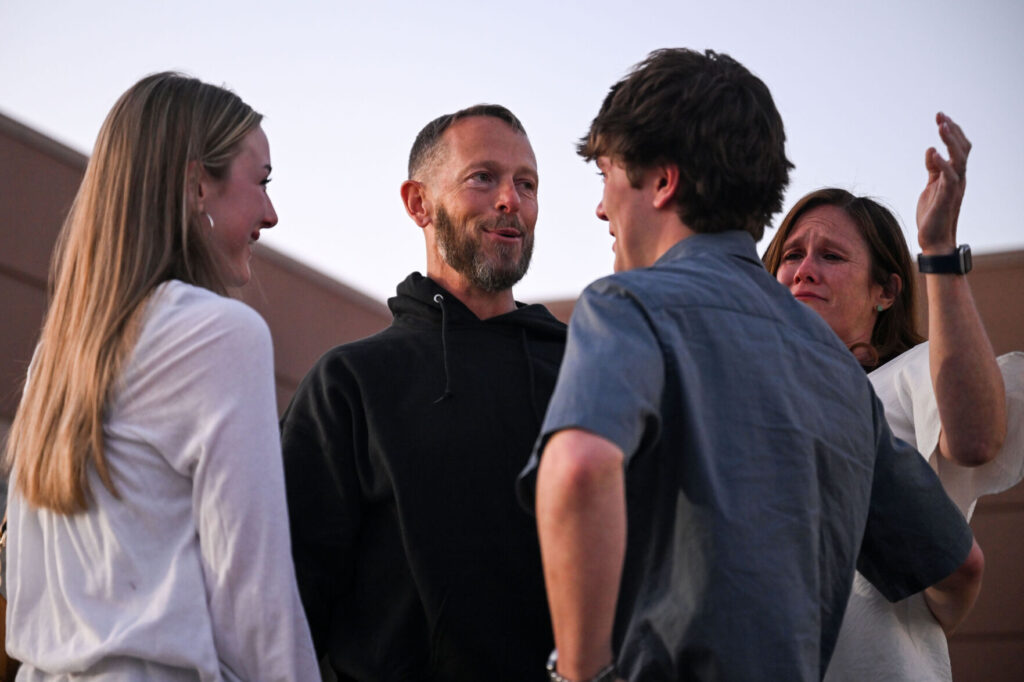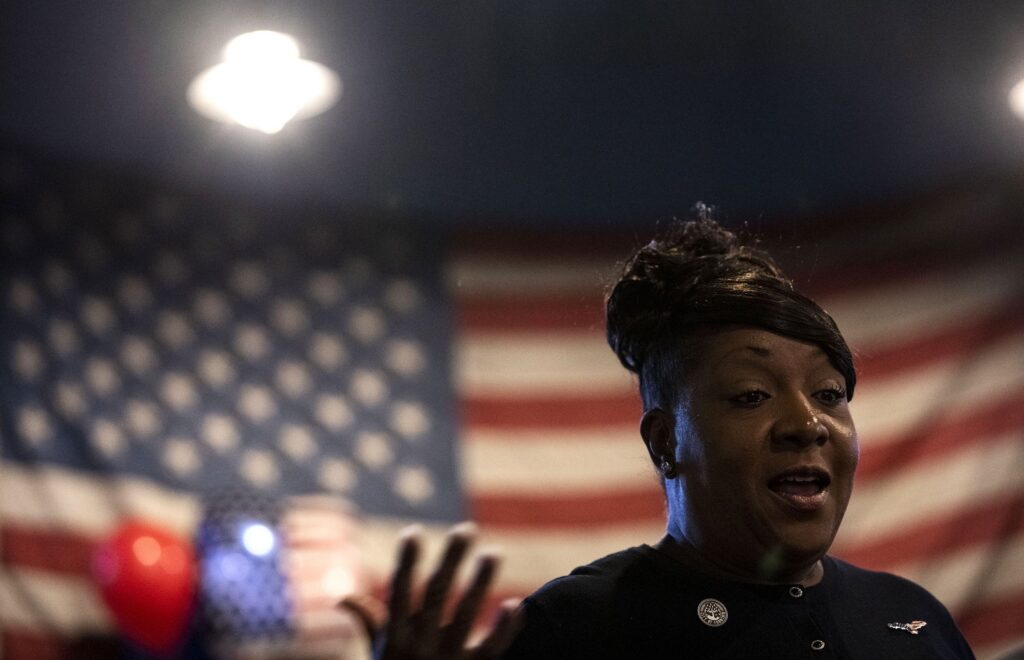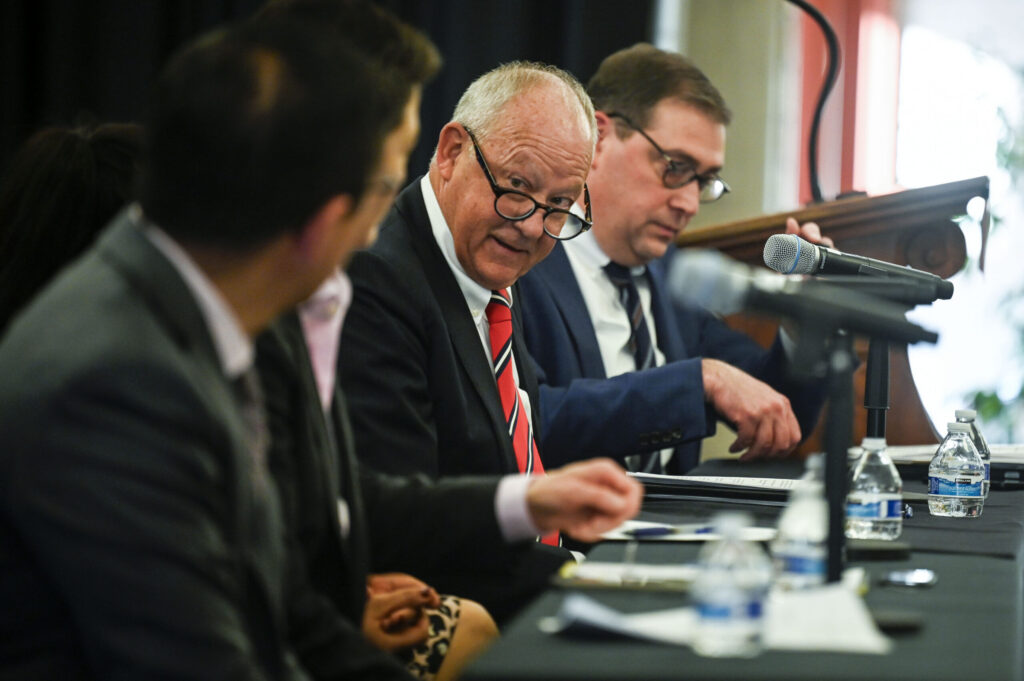Colorado justices weigh constitutional implications of livestreaming criminal trials
With the Sixth Amendment guaranteeing criminal defendants the right to a public trial, members of the Colorado Supreme Court grappled on Tuesday with a question that may have never arisen without a global pandemic: If a judge requires spectators to watch the trial remotely, is there a constitutional violation?
In a pair of cases stemming from pandemic-era trials, the justices considered whether to render a decision using existing legal principles and the specific facts of each criminal proceeding, or to get in front of further technological changes that may unfold in the near future.
“I’m very wary of writing an opinion,” said Justice Melissa Hart, “that ignores the possibility that in the future, a courtroom will be virtual. … We’re careening towards a world where things are happening online.”
The Colorado Attorney General’s Office encouraged the court to think about a judge’s decision to stream proceedings as a way to promote access, even if the physical courtroom is closed. So long as certain stipulations are met, the purposes of the public trial guarantee — like discouraging perjury and reminding the participants of their duty to treat the accused fairly — would be met.
The defendants’ lawyers, on the other hand, maintained that keeping the physical courtroom open is paramount, as a virtual audience does not foster the same dynamics as in-person observation.
“If this court holds that the Sixth Amendment right to a public trial is satisfied when the physical courtroom is locked and members of the public have access only through livestreaming,” said public defender Meredith K. Rose, “then the constitutional guarantee becomes nothing more than the right to watch television.”

Colorado Deputy State Public Defender Meredith Rose, left, looks on as Assistant Attorney General Jaycey DeHoyos makes her oral argument in the second of two Colorado Court of Appeals cases being held in the library of Conifer Senior High School as part of the Courts in the Community educational outreach program on Tuesday, May 16, 2023, in Conifer, Colo. (Timothy Hurst/Denver Gazette)
The national and state supreme courts have recognized that some circumstances may justify a judge’s decision to not keep their courtroom open to everyone — such as a spectator causing disruption or the closure being “trivial” in nature. Under the U.S. Supreme Court’s 1984 ruling in Waller v. Georgia, trial judges must consider specific factors when deciding whether to close a courtroom to one or more people. Unless justified, a violation of the right to a public trial triggers automatic reversal of a defendant’s convictions.
But does a judge necessarily close “the courtroom” when it is possible to see the trial remotely?
Excluding the public
Michelle Re Nae Bialas was on trial for the second time in 2021, with public health protocols to prevent COVID-19 transmission still in place. Courtroom capacity was limited and another room in the courthouse had a live video feed of the trial. Beforehand, the parties agreed the families for Bialas and the victim would be in the courtroom, rather than the remote viewing room.
During the proceedings, some jurors reported hearing talk among the audience about Bialas’ previous trial. Although the commentary appeared to come from the alleged victim’s family, not Bialas’, Gilpin County District Court Judge Todd L. Vriesman ordered everyone to the overflow room for the rest of the trial. He said he was “not going to sit around” to determine who was at fault.
Bialas appealed Vriesman’s decision to close his physical courtroom to her family, and a three-judge panel for the Court of Appeals agreed Vriesman had not established a compelling reason to eject everyone in lieu of figuring out whose commentary was affecting the jury.
“The court did not simply admonish the spectators not to discuss the prior trial. Instead, it excluded the entire public, including Bialas’s family, based on the misbehavior of a few spectators,” wrote Judge Ted C. Tow III. “This action exceeded what was necessary to insulate the jury from improper statements.”

Colorado Court of Appeals Judge Ted C. Tow III asks a question to Assistant Attorney General Jaycey DeHoyos, not pictured, during oral arguments in the second of two Colorado Court of Appeals cases being held in the library of Conifer Senior High School as part of the Courts in the Community educational outreach program on Tuesday, May 16, 2023, in Conifer, Colo. (Timothy Hurst/Denver Gazette)
In contrast, Isaiah Ismael Rios’ jury trial was the first felony case to proceed in Boulder County following the onset of the COVID-19 pandemic. His October 2020 trial had multiple public health precautions, including distancing, masking and a livestream in an overflow room for spectators.
Rios, who was convicted of murder and other serious offenses, appealed the closure of the physical courtroom. Three months after the Court of Appeals issued its decision in Bialas’ case, a different panel likewise agreed Rios’ courtroom was partially closed to the public.
However, the panel concluded the exclusion was justified under the U.S. Supreme Court’s test because of the overriding need to protect against infections.
“The record reveals the court’s concern with preventing the spread of COVID-19 among trial participants and shows that it crafted a reasonable response,” wrote Judge Rebecca R. Freyre.
To the Supreme Court, the government argued no constitutional violation occurs if trial judges offer spectators a free option to observe in real time, and the trial participants are aware they may be watched. However, Justice Richard L. Gabriel warned that such a framework could allow judges to bar spectators from their physical courtrooms in every case, so long as they provided a livestream.
“There would not be a constitutional violation there,” acknowledged Assistant Attorney General Jaycey DeHoyos.
“If, in fact, the technology shuts down for whatever reason, you lose accessibility,” said Justice Maria E. Berkenkotter. “Isn’t that a tremendous problem with the rule you’re proposing?”
Courtrooms of the future?
The justices asked the attorneys to address a range of other scenarios: What if a courtroom is filled to capacity with spectators and a defendant’s family cannot get in? What if a trial is streamed in an area without reliable broadband and a clerk shuts off the video feed to preserve the audio quality? Because the Supreme Court held oral arguments entirely online during the early pandemic, was that a constitutional violation?

Justice Maria E. Berkenkotter asks a question during the Colorado Supreme Court’s oral arguments on Feb. 9, 2021. The Supreme Court has live streamed and archived its proceedings for more than a half decade, but oral arguments during the COVID-19 pandemic took place over Webex.
In the 21st Judicial District of Mesa County, added Chief Justice Monica M. Márquez, there are “certain judges that have entirely virtual dockets because there is no space. So, there are judges today that do not have a physical courtroom.”
Hart wondered whether the court’s ultimate decision should try to anticipate where courtroom technology may be headed and provide guidance for complying with the Sixth Amendment.
“‘In the courtroom’ meant something very significant in 1948 that it may not mean in 2028. Is it possible that ‘in the courtroom’ in 2028 or 2038 won’t be a thing?” she asked.
Rose, the attorney for Bialas, advocated for the justices to stick with the U.S. Supreme Court’s decades-old test for evaluating the constitutionality of courtroom closures, which the Court of Appeals used to find a Sixth Amendment violation. She added that Bialas, her friends and family, defense lawyers, employees of the attorney general’s office and high school students were all in the audience during arguments.
“Each one of these spectators could have stayed home and watched this oral argument remotely,” Rose said. “But we all intuitively understand that there’s a difference between in-person attendance and online observation. And that difference is exactly what’s at stake in this appeal.”
The cases are People v. Bialas and Rios v. People.











